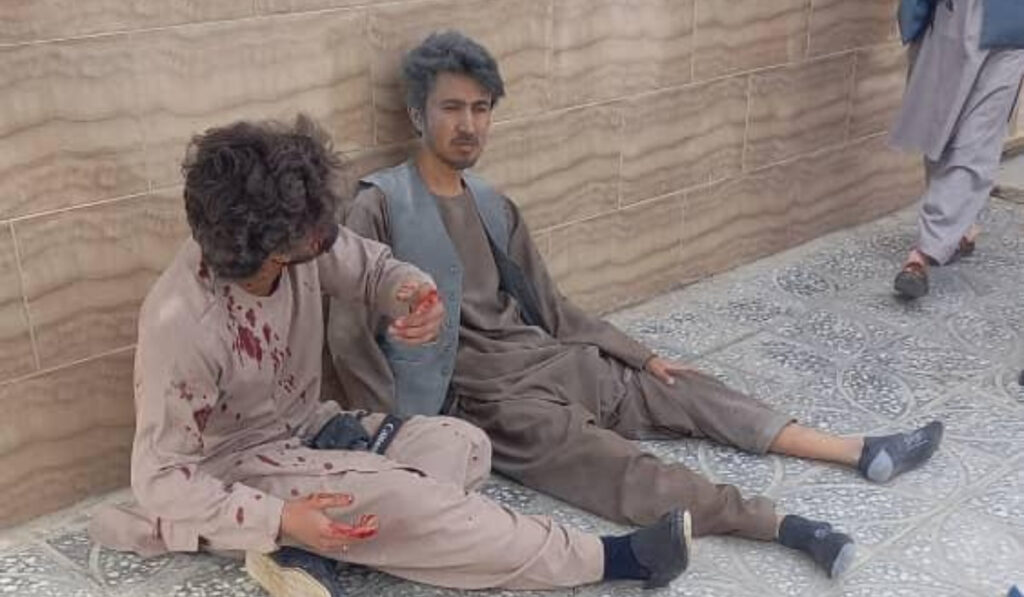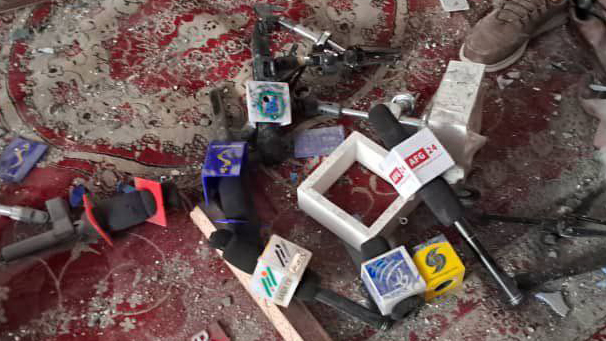Reporters Without Borders (RSF) has called on the Taliban to bring those responsible for last week’s bombing on journalists in Mazar-e-Sharif to justice and stated the explosion, that left two journalists dead, and more than a dozen wounded, was the “biggest attack” on Afghan journalists in months.
In a statement published on their website, RSF said they had spoken to reporters who were at Saturday’s ceremony to honor media personnel in Mazar, in northern Balkh province, and that “it is extremely shocking to see journalists targeted for the sole reason that they are journalists.”
“We call on acting governor (of Balkh) Haji Mohammad Yousuf Wafa to identify the perpetrators of this attack without delay so that they can be held to account in court for the sake of justice for the two slain reporters and all the other media workers who were injured.
A freelance photo-journalist Atif Aryan told RSF that Saturday’s “ceremony started at 10:40 a.m. and the bomb exploded at 10:50 a.m., while children were singing an anthem.”
“When the bomb went off, we all fell to the floor and began scrambling for an exit. But we were in a basement, it was hard to get out, and the security measures were non-existent. We are still in shock,” he said.
Around 100 people were attending the award ceremony to mark “Afghan Journalists Day” in the basement of the Shia Tabyan Cultural Centre when a parcel bomb exploded, killing a security guard instantly and injuring at least 17 journalists, including two reporters who were pronounced dead the next day.
They were Ava Press agency reporter Sayed Hussain Naderi and his assistant, journalism student Akmal Tabian.

Daesh claimed responsibility for the bombing in a statement published by its Amaq News Agency. The attack targeted “journalists working in agencies involved in the war against the Islamic State,” the militant group said.
Quoting Arif Karimi, the head of the media freedom organization NAI, RSF reported the “attack was one of a kind and was the biggest attack on our profession in many months.”
Karimi also told RSF that journalists who were present at the ceremony were penalized a second time in the form of interrogation by the security forces.
“Security agencies should know that questioning and interrogation is a practice that can be done only according to the laws of the country,” he said. “Journalists should not be considered suspects and questioned at the same time as they are victims.”
RSF has confirmed that the local Taliban authorities confiscated equipment and personal effects from all the journalists present. Three days after the bombing, some of the journalists had still not recovered their cameras.
The Committee to Protect Journalists meanwhile also condemned the attack and said “it’s barbaric to target journalists at an event meant to celebrate their courage and determination to keep the world informed about Afghanistan.”
Beh Lih Yi, CPJ’s Asia program coordinator said: “The recent deadly bombing is a painful reminder of the hostile climate for journalists and the drastic decline of press freedom since the Taliban takeover. The Taliban must do everything they can to protect journalists and let them work safely.”
Afghanistan was ranked fourth on CPJ’s 2022 Global Impunity Index, which spotlights countries with the worst records for prosecuting murderers of journalists.
Journalists targeted
According to RSF, Afghan journalists have been among the leading targets of the Taliban since they seized power in Kabul in August 2021.
Information obtained by RSF indicated that more than half of the 526 media outlets operating in Afghanistan in the past two decades have had to shut down since the Taliban takeover. The print media are now entirely controlled by the Taliban and near half the radio stations have stopped broadcasting.Of the 30 news sites that Afghanistan had before August 2021, nearly 60 percent have closed and most have had to move abroad.





